Analyzing Nestle's Quality Problems and TQM Strategies (BDPO4103)
VerifiedAdded on 2023/04/23
|10
|2947
|424
Report
AI Summary
This report provides an in-depth analysis of Nestle's Total Quality Management (TQM) practices, focusing on the quality problems the company has faced, particularly concerning its Maggi product. The paper begins with an introduction to Nestle and the concept of TQM, defining quality and outlining the elements of TQM, such as ethics, integrity, trust, training, teamwork, and leadership. It then explores the specific quality issues within Nestle, including the controversy surrounding Maggi's ingredients, such as high levels of lead and MSG. The report identifies the causes of these quality issues, including short-term planning, failure to consider customer requirements, and a lack of supervision and monitoring. The paper concludes with a series of recommendations for Nestle to improve its quality control and operational efficiency, including employee training, the establishment of quality circles, the implementation of quality control tools, and improved labor planning. The report aims to provide insights into how Nestle can enhance its product quality and maintain customer trust.
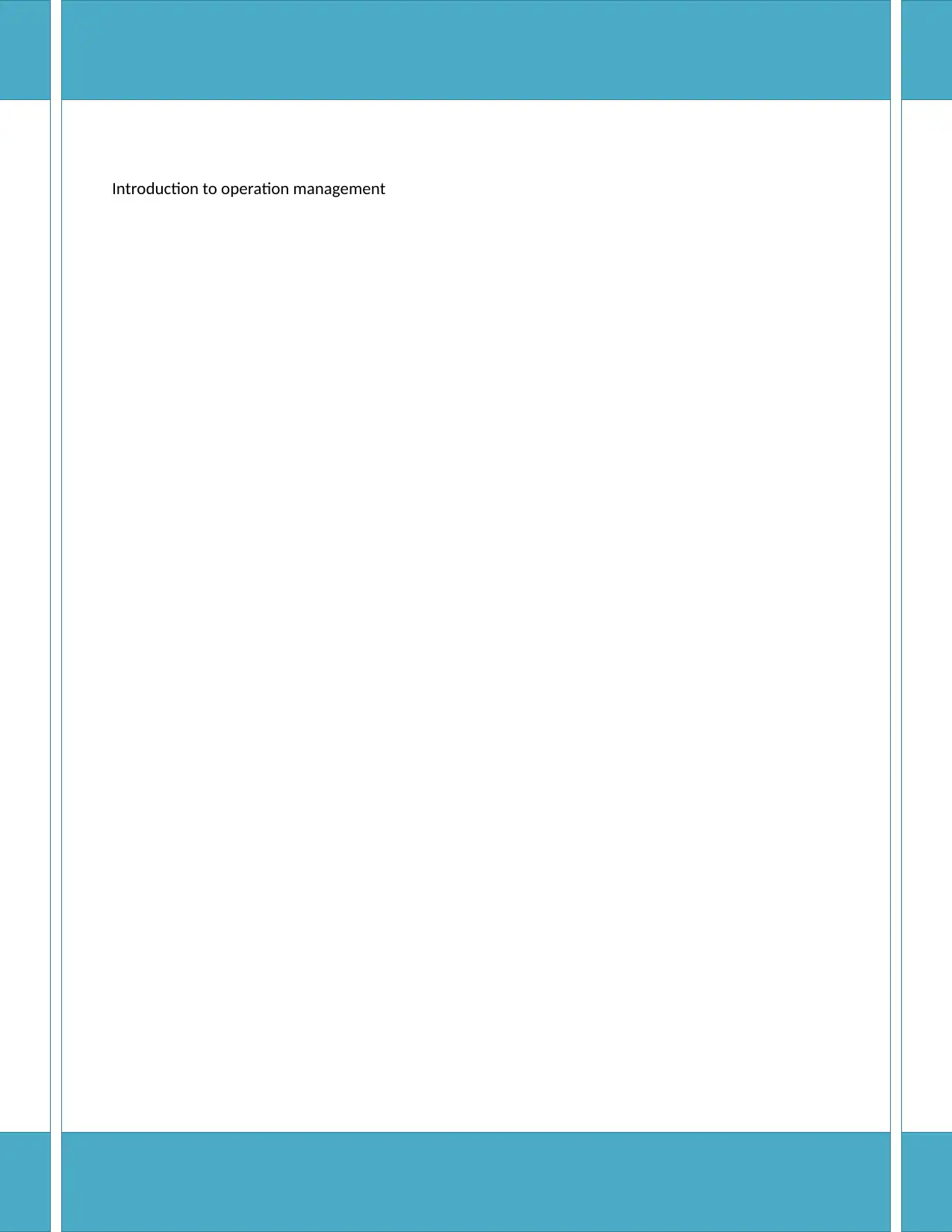
Introduction to operation management
Paraphrase This Document
Need a fresh take? Get an instant paraphrase of this document with our AI Paraphraser
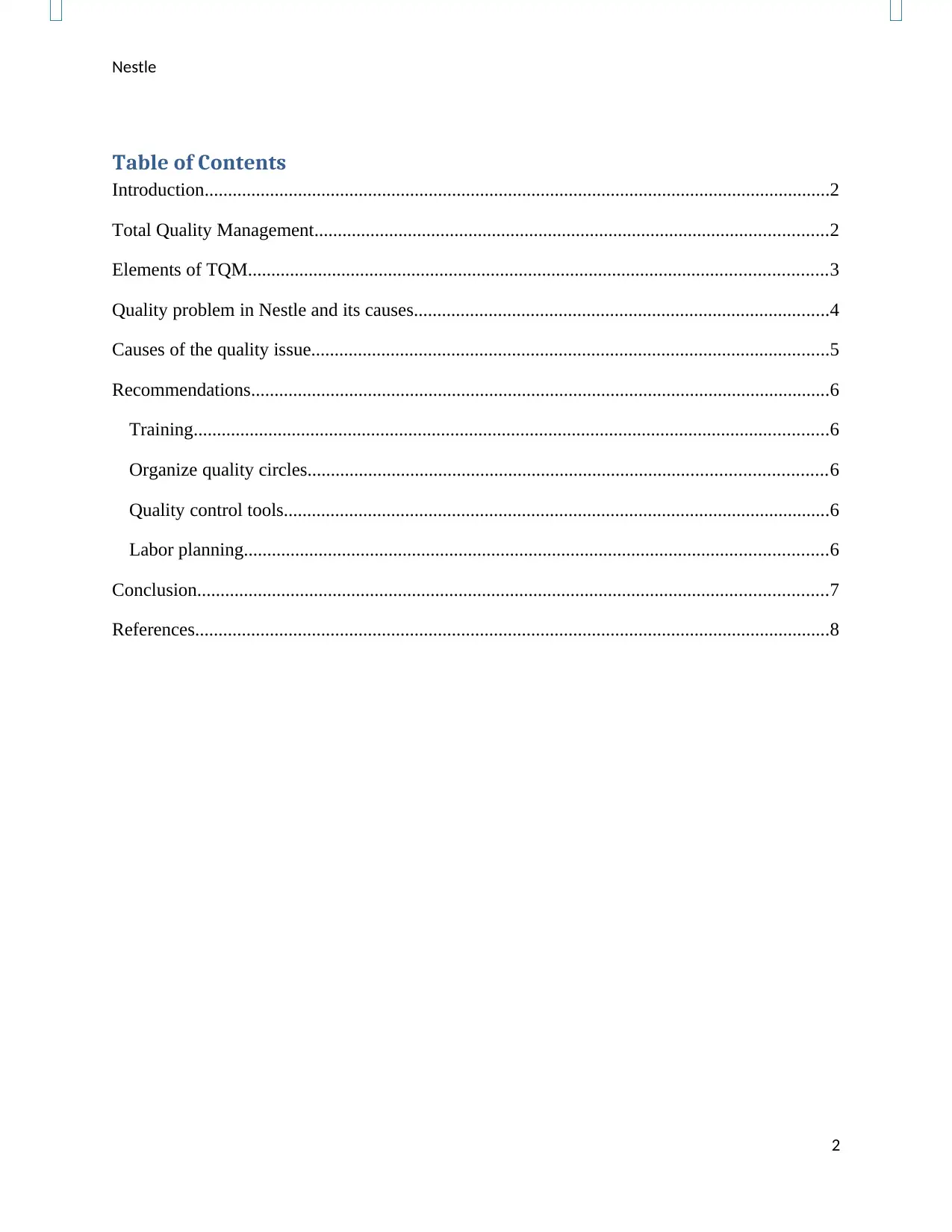
Nestle
Table of Contents
Introduction......................................................................................................................................2
Total Quality Management..............................................................................................................2
Elements of TQM............................................................................................................................3
Quality problem in Nestle and its causes.........................................................................................4
Causes of the quality issue...............................................................................................................5
Recommendations............................................................................................................................6
Training........................................................................................................................................6
Organize quality circles...............................................................................................................6
Quality control tools.....................................................................................................................6
Labor planning.............................................................................................................................6
Conclusion.......................................................................................................................................7
References........................................................................................................................................8
2
Table of Contents
Introduction......................................................................................................................................2
Total Quality Management..............................................................................................................2
Elements of TQM............................................................................................................................3
Quality problem in Nestle and its causes.........................................................................................4
Causes of the quality issue...............................................................................................................5
Recommendations............................................................................................................................6
Training........................................................................................................................................6
Organize quality circles...............................................................................................................6
Quality control tools.....................................................................................................................6
Labor planning.............................................................................................................................6
Conclusion.......................................................................................................................................7
References........................................................................................................................................8
2
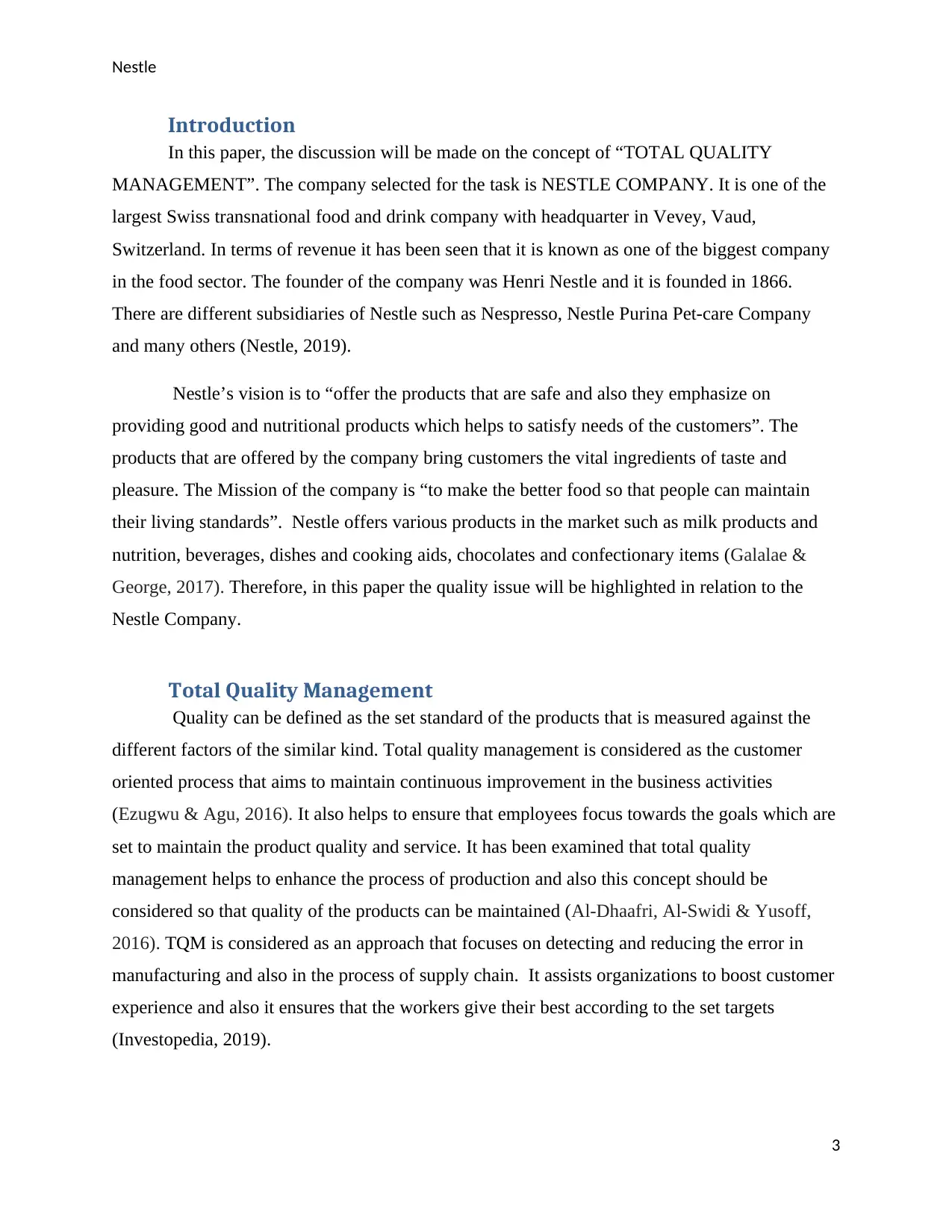
Nestle
Introduction
In this paper, the discussion will be made on the concept of “TOTAL QUALITY
MANAGEMENT”. The company selected for the task is NESTLE COMPANY. It is one of the
largest Swiss transnational food and drink company with headquarter in Vevey, Vaud,
Switzerland. In terms of revenue it has been seen that it is known as one of the biggest company
in the food sector. The founder of the company was Henri Nestle and it is founded in 1866.
There are different subsidiaries of Nestle such as Nespresso, Nestle Purina Pet-care Company
and many others (Nestle, 2019).
Nestle’s vision is to “offer the products that are safe and also they emphasize on
providing good and nutritional products which helps to satisfy needs of the customers”. The
products that are offered by the company bring customers the vital ingredients of taste and
pleasure. The Mission of the company is “to make the better food so that people can maintain
their living standards”. Nestle offers various products in the market such as milk products and
nutrition, beverages, dishes and cooking aids, chocolates and confectionary items (Galalae &
George, 2017). Therefore, in this paper the quality issue will be highlighted in relation to the
Nestle Company.
Total Quality Management
Quality can be defined as the set standard of the products that is measured against the
different factors of the similar kind. Total quality management is considered as the customer
oriented process that aims to maintain continuous improvement in the business activities
(Ezugwu & Agu, 2016). It also helps to ensure that employees focus towards the goals which are
set to maintain the product quality and service. It has been examined that total quality
management helps to enhance the process of production and also this concept should be
considered so that quality of the products can be maintained (Al-Dhaafri, Al-Swidi & Yusoff,
2016). TQM is considered as an approach that focuses on detecting and reducing the error in
manufacturing and also in the process of supply chain. It assists organizations to boost customer
experience and also it ensures that the workers give their best according to the set targets
(Investopedia, 2019).
3
Introduction
In this paper, the discussion will be made on the concept of “TOTAL QUALITY
MANAGEMENT”. The company selected for the task is NESTLE COMPANY. It is one of the
largest Swiss transnational food and drink company with headquarter in Vevey, Vaud,
Switzerland. In terms of revenue it has been seen that it is known as one of the biggest company
in the food sector. The founder of the company was Henri Nestle and it is founded in 1866.
There are different subsidiaries of Nestle such as Nespresso, Nestle Purina Pet-care Company
and many others (Nestle, 2019).
Nestle’s vision is to “offer the products that are safe and also they emphasize on
providing good and nutritional products which helps to satisfy needs of the customers”. The
products that are offered by the company bring customers the vital ingredients of taste and
pleasure. The Mission of the company is “to make the better food so that people can maintain
their living standards”. Nestle offers various products in the market such as milk products and
nutrition, beverages, dishes and cooking aids, chocolates and confectionary items (Galalae &
George, 2017). Therefore, in this paper the quality issue will be highlighted in relation to the
Nestle Company.
Total Quality Management
Quality can be defined as the set standard of the products that is measured against the
different factors of the similar kind. Total quality management is considered as the customer
oriented process that aims to maintain continuous improvement in the business activities
(Ezugwu & Agu, 2016). It also helps to ensure that employees focus towards the goals which are
set to maintain the product quality and service. It has been examined that total quality
management helps to enhance the process of production and also this concept should be
considered so that quality of the products can be maintained (Al-Dhaafri, Al-Swidi & Yusoff,
2016). TQM is considered as an approach that focuses on detecting and reducing the error in
manufacturing and also in the process of supply chain. It assists organizations to boost customer
experience and also it ensures that the workers give their best according to the set targets
(Investopedia, 2019).
3
⊘ This is a preview!⊘
Do you want full access?
Subscribe today to unlock all pages.

Trusted by 1+ million students worldwide
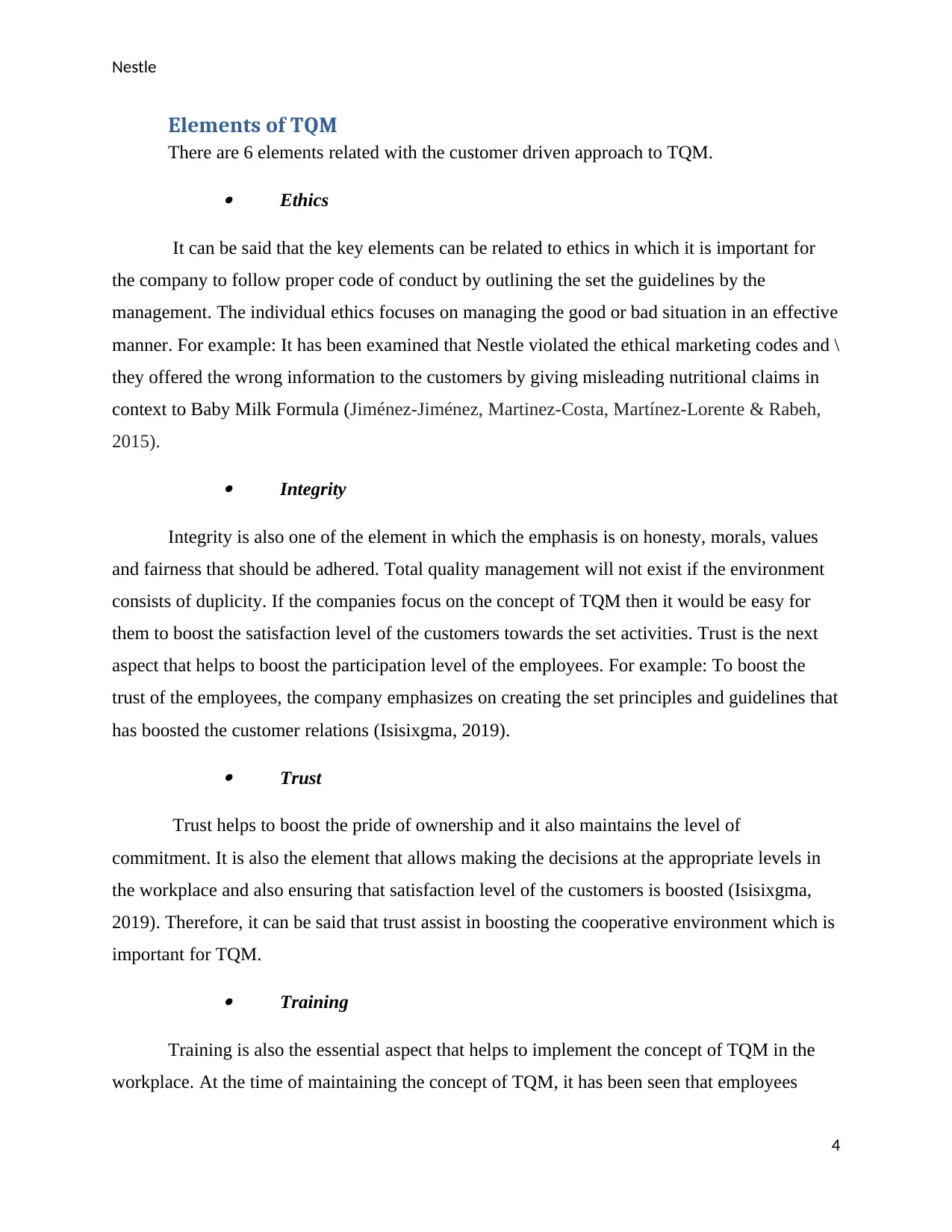
Nestle
Elements of TQM
There are 6 elements related with the customer driven approach to TQM.
Ethics
It can be said that the key elements can be related to ethics in which it is important for
the company to follow proper code of conduct by outlining the set the guidelines by the
management. The individual ethics focuses on managing the good or bad situation in an effective
manner. For example: It has been examined that Nestle violated the ethical marketing codes and \
they offered the wrong information to the customers by giving misleading nutritional claims in
context to Baby Milk Formula (Jiménez-Jiménez, Martinez-Costa, Martínez-Lorente & Rabeh,
2015). Integrity
Integrity is also one of the element in which the emphasis is on honesty, morals, values
and fairness that should be adhered. Total quality management will not exist if the environment
consists of duplicity. If the companies focus on the concept of TQM then it would be easy for
them to boost the satisfaction level of the customers towards the set activities. Trust is the next
aspect that helps to boost the participation level of the employees. For example: To boost the
trust of the employees, the company emphasizes on creating the set principles and guidelines that
has boosted the customer relations (Isisixgma, 2019).
Trust
Trust helps to boost the pride of ownership and it also maintains the level of
commitment. It is also the element that allows making the decisions at the appropriate levels in
the workplace and also ensuring that satisfaction level of the customers is boosted (Isisixgma,
2019). Therefore, it can be said that trust assist in boosting the cooperative environment which is
important for TQM.
Training
Training is also the essential aspect that helps to implement the concept of TQM in the
workplace. At the time of maintaining the concept of TQM, it has been seen that employees
4
Elements of TQM
There are 6 elements related with the customer driven approach to TQM.
Ethics
It can be said that the key elements can be related to ethics in which it is important for
the company to follow proper code of conduct by outlining the set the guidelines by the
management. The individual ethics focuses on managing the good or bad situation in an effective
manner. For example: It has been examined that Nestle violated the ethical marketing codes and \
they offered the wrong information to the customers by giving misleading nutritional claims in
context to Baby Milk Formula (Jiménez-Jiménez, Martinez-Costa, Martínez-Lorente & Rabeh,
2015). Integrity
Integrity is also one of the element in which the emphasis is on honesty, morals, values
and fairness that should be adhered. Total quality management will not exist if the environment
consists of duplicity. If the companies focus on the concept of TQM then it would be easy for
them to boost the satisfaction level of the customers towards the set activities. Trust is the next
aspect that helps to boost the participation level of the employees. For example: To boost the
trust of the employees, the company emphasizes on creating the set principles and guidelines that
has boosted the customer relations (Isisixgma, 2019).
Trust
Trust helps to boost the pride of ownership and it also maintains the level of
commitment. It is also the element that allows making the decisions at the appropriate levels in
the workplace and also ensuring that satisfaction level of the customers is boosted (Isisixgma,
2019). Therefore, it can be said that trust assist in boosting the cooperative environment which is
important for TQM.
Training
Training is also the essential aspect that helps to implement the concept of TQM in the
workplace. At the time of maintaining the concept of TQM, it has been seen that employees
4
Paraphrase This Document
Need a fresh take? Get an instant paraphrase of this document with our AI Paraphraser
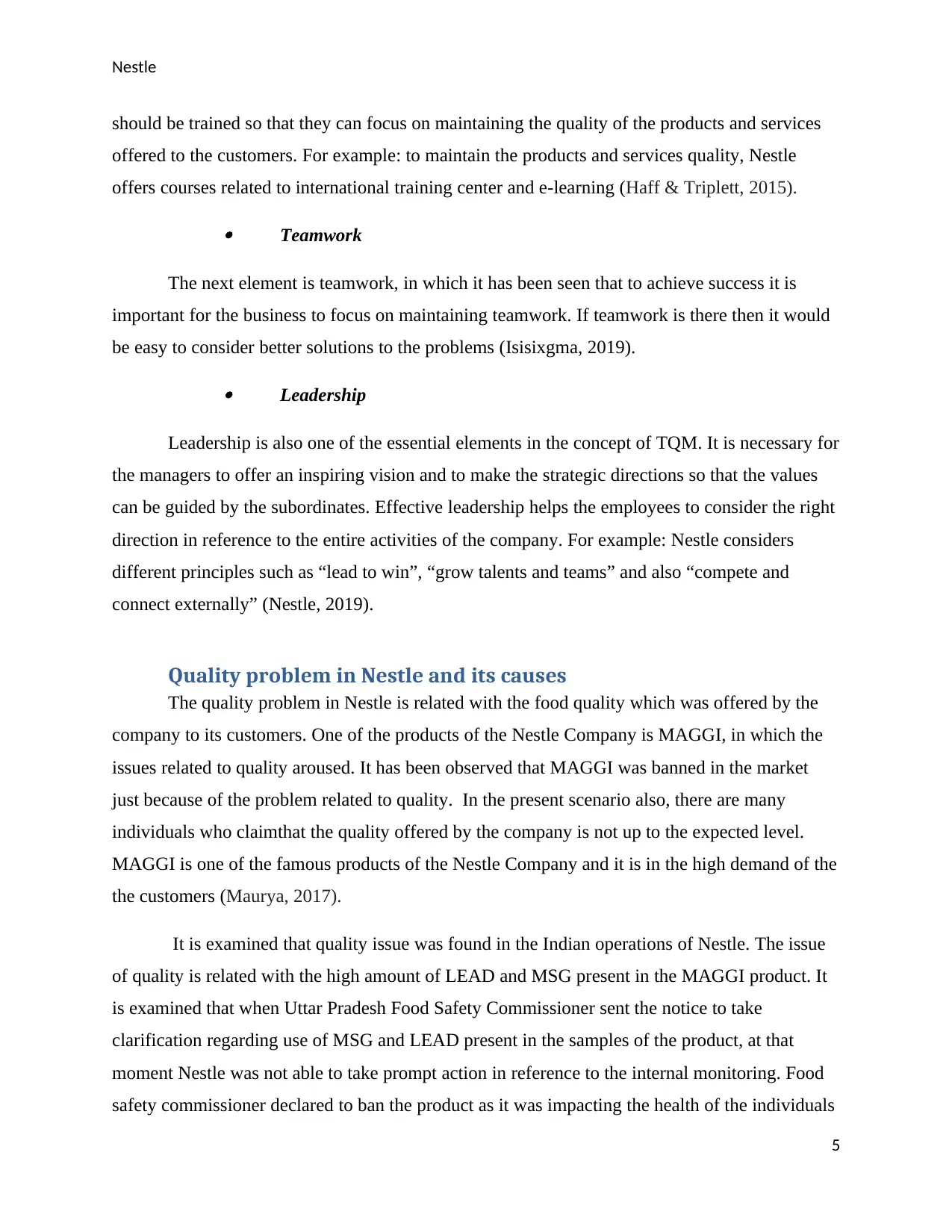
Nestle
should be trained so that they can focus on maintaining the quality of the products and services
offered to the customers. For example: to maintain the products and services quality, Nestle
offers courses related to international training center and e-learning (Haff & Triplett, 2015).
Teamwork
The next element is teamwork, in which it has been seen that to achieve success it is
important for the business to focus on maintaining teamwork. If teamwork is there then it would
be easy to consider better solutions to the problems (Isisixgma, 2019).
Leadership
Leadership is also one of the essential elements in the concept of TQM. It is necessary for
the managers to offer an inspiring vision and to make the strategic directions so that the values
can be guided by the subordinates. Effective leadership helps the employees to consider the right
direction in reference to the entire activities of the company. For example: Nestle considers
different principles such as “lead to win”, “grow talents and teams” and also “compete and
connect externally” (Nestle, 2019).
Quality problem in Nestle and its causes
The quality problem in Nestle is related with the food quality which was offered by the
company to its customers. One of the products of the Nestle Company is MAGGI, in which the
issues related to quality aroused. It has been observed that MAGGI was banned in the market
just because of the problem related to quality. In the present scenario also, there are many
individuals who claimthat the quality offered by the company is not up to the expected level.
MAGGI is one of the famous products of the Nestle Company and it is in the high demand of the
the customers (Maurya, 2017).
It is examined that quality issue was found in the Indian operations of Nestle. The issue
of quality is related with the high amount of LEAD and MSG present in the MAGGI product. It
is examined that when Uttar Pradesh Food Safety Commissioner sent the notice to take
clarification regarding use of MSG and LEAD present in the samples of the product, at that
moment Nestle was not able to take prompt action in reference to the internal monitoring. Food
safety commissioner declared to ban the product as it was impacting the health of the individuals
5
should be trained so that they can focus on maintaining the quality of the products and services
offered to the customers. For example: to maintain the products and services quality, Nestle
offers courses related to international training center and e-learning (Haff & Triplett, 2015).
Teamwork
The next element is teamwork, in which it has been seen that to achieve success it is
important for the business to focus on maintaining teamwork. If teamwork is there then it would
be easy to consider better solutions to the problems (Isisixgma, 2019).
Leadership
Leadership is also one of the essential elements in the concept of TQM. It is necessary for
the managers to offer an inspiring vision and to make the strategic directions so that the values
can be guided by the subordinates. Effective leadership helps the employees to consider the right
direction in reference to the entire activities of the company. For example: Nestle considers
different principles such as “lead to win”, “grow talents and teams” and also “compete and
connect externally” (Nestle, 2019).
Quality problem in Nestle and its causes
The quality problem in Nestle is related with the food quality which was offered by the
company to its customers. One of the products of the Nestle Company is MAGGI, in which the
issues related to quality aroused. It has been observed that MAGGI was banned in the market
just because of the problem related to quality. In the present scenario also, there are many
individuals who claimthat the quality offered by the company is not up to the expected level.
MAGGI is one of the famous products of the Nestle Company and it is in the high demand of the
the customers (Maurya, 2017).
It is examined that quality issue was found in the Indian operations of Nestle. The issue
of quality is related with the high amount of LEAD and MSG present in the MAGGI product. It
is examined that when Uttar Pradesh Food Safety Commissioner sent the notice to take
clarification regarding use of MSG and LEAD present in the samples of the product, at that
moment Nestle was not able to take prompt action in reference to the internal monitoring. Food
safety commissioner declared to ban the product as it was impacting the health of the individuals
5
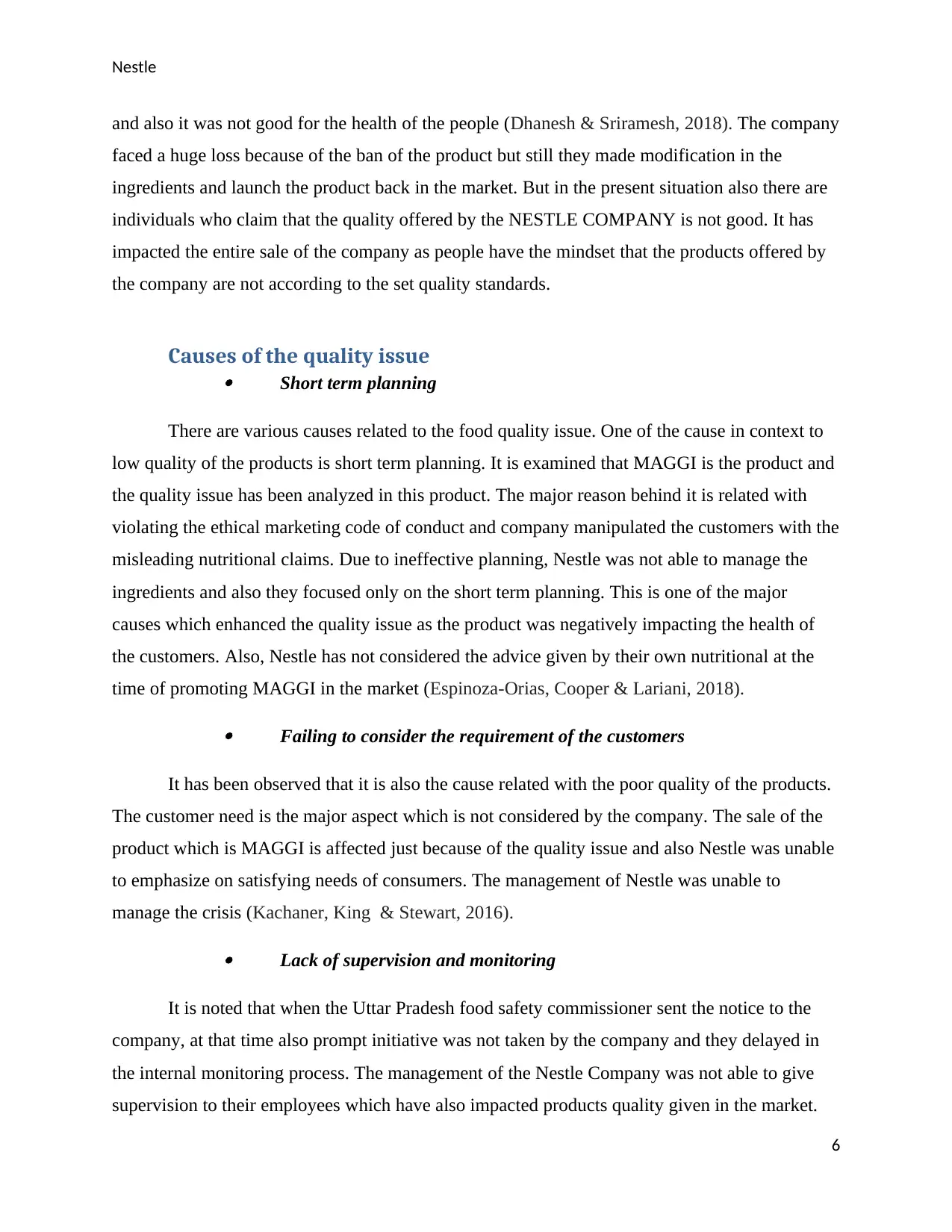
Nestle
and also it was not good for the health of the people (Dhanesh & Sriramesh, 2018). The company
faced a huge loss because of the ban of the product but still they made modification in the
ingredients and launch the product back in the market. But in the present situation also there are
individuals who claim that the quality offered by the NESTLE COMPANY is not good. It has
impacted the entire sale of the company as people have the mindset that the products offered by
the company are not according to the set quality standards.
Causes of the quality issue
Short term planning
There are various causes related to the food quality issue. One of the cause in context to
low quality of the products is short term planning. It is examined that MAGGI is the product and
the quality issue has been analyzed in this product. The major reason behind it is related with
violating the ethical marketing code of conduct and company manipulated the customers with the
misleading nutritional claims. Due to ineffective planning, Nestle was not able to manage the
ingredients and also they focused only on the short term planning. This is one of the major
causes which enhanced the quality issue as the product was negatively impacting the health of
the customers. Also, Nestle has not considered the advice given by their own nutritional at the
time of promoting MAGGI in the market (Espinoza-Orias, Cooper & Lariani, 2018).
Failing to consider the requirement of the customers
It has been observed that it is also the cause related with the poor quality of the products.
The customer need is the major aspect which is not considered by the company. The sale of the
product which is MAGGI is affected just because of the quality issue and also Nestle was unable
to emphasize on satisfying needs of consumers. The management of Nestle was unable to
manage the crisis (Kachaner, King & Stewart, 2016).
Lack of supervision and monitoring
It is noted that when the Uttar Pradesh food safety commissioner sent the notice to the
company, at that time also prompt initiative was not taken by the company and they delayed in
the internal monitoring process. The management of the Nestle Company was not able to give
supervision to their employees which have also impacted products quality given in the market.
6
and also it was not good for the health of the people (Dhanesh & Sriramesh, 2018). The company
faced a huge loss because of the ban of the product but still they made modification in the
ingredients and launch the product back in the market. But in the present situation also there are
individuals who claim that the quality offered by the NESTLE COMPANY is not good. It has
impacted the entire sale of the company as people have the mindset that the products offered by
the company are not according to the set quality standards.
Causes of the quality issue
Short term planning
There are various causes related to the food quality issue. One of the cause in context to
low quality of the products is short term planning. It is examined that MAGGI is the product and
the quality issue has been analyzed in this product. The major reason behind it is related with
violating the ethical marketing code of conduct and company manipulated the customers with the
misleading nutritional claims. Due to ineffective planning, Nestle was not able to manage the
ingredients and also they focused only on the short term planning. This is one of the major
causes which enhanced the quality issue as the product was negatively impacting the health of
the customers. Also, Nestle has not considered the advice given by their own nutritional at the
time of promoting MAGGI in the market (Espinoza-Orias, Cooper & Lariani, 2018).
Failing to consider the requirement of the customers
It has been observed that it is also the cause related with the poor quality of the products.
The customer need is the major aspect which is not considered by the company. The sale of the
product which is MAGGI is affected just because of the quality issue and also Nestle was unable
to emphasize on satisfying needs of consumers. The management of Nestle was unable to
manage the crisis (Kachaner, King & Stewart, 2016).
Lack of supervision and monitoring
It is noted that when the Uttar Pradesh food safety commissioner sent the notice to the
company, at that time also prompt initiative was not taken by the company and they delayed in
the internal monitoring process. The management of the Nestle Company was not able to give
supervision to their employees which have also impacted products quality given in the market.
6
⊘ This is a preview!⊘
Do you want full access?
Subscribe today to unlock all pages.

Trusted by 1+ million students worldwide
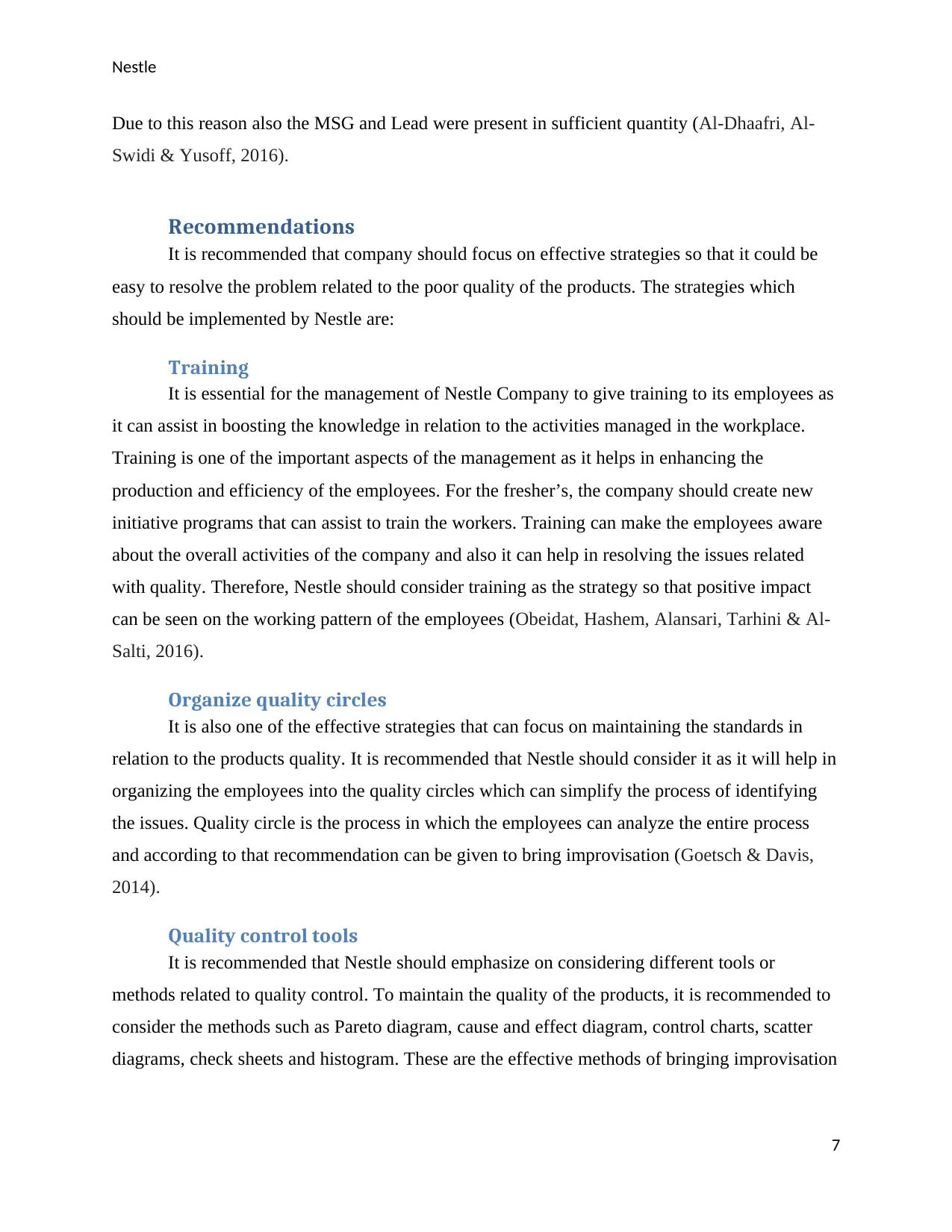
Nestle
Due to this reason also the MSG and Lead were present in sufficient quantity (Al-Dhaafri, Al-
Swidi & Yusoff, 2016).
Recommendations
It is recommended that company should focus on effective strategies so that it could be
easy to resolve the problem related to the poor quality of the products. The strategies which
should be implemented by Nestle are:
Training
It is essential for the management of Nestle Company to give training to its employees as
it can assist in boosting the knowledge in relation to the activities managed in the workplace.
Training is one of the important aspects of the management as it helps in enhancing the
production and efficiency of the employees. For the fresher’s, the company should create new
initiative programs that can assist to train the workers. Training can make the employees aware
about the overall activities of the company and also it can help in resolving the issues related
with quality. Therefore, Nestle should consider training as the strategy so that positive impact
can be seen on the working pattern of the employees (Obeidat, Hashem, Alansari, Tarhini & Al-
Salti, 2016).
Organize quality circles
It is also one of the effective strategies that can focus on maintaining the standards in
relation to the products quality. It is recommended that Nestle should consider it as it will help in
organizing the employees into the quality circles which can simplify the process of identifying
the issues. Quality circle is the process in which the employees can analyze the entire process
and according to that recommendation can be given to bring improvisation (Goetsch & Davis,
2014).
Quality control tools
It is recommended that Nestle should emphasize on considering different tools or
methods related to quality control. To maintain the quality of the products, it is recommended to
consider the methods such as Pareto diagram, cause and effect diagram, control charts, scatter
diagrams, check sheets and histogram. These are the effective methods of bringing improvisation
7
Due to this reason also the MSG and Lead were present in sufficient quantity (Al-Dhaafri, Al-
Swidi & Yusoff, 2016).
Recommendations
It is recommended that company should focus on effective strategies so that it could be
easy to resolve the problem related to the poor quality of the products. The strategies which
should be implemented by Nestle are:
Training
It is essential for the management of Nestle Company to give training to its employees as
it can assist in boosting the knowledge in relation to the activities managed in the workplace.
Training is one of the important aspects of the management as it helps in enhancing the
production and efficiency of the employees. For the fresher’s, the company should create new
initiative programs that can assist to train the workers. Training can make the employees aware
about the overall activities of the company and also it can help in resolving the issues related
with quality. Therefore, Nestle should consider training as the strategy so that positive impact
can be seen on the working pattern of the employees (Obeidat, Hashem, Alansari, Tarhini & Al-
Salti, 2016).
Organize quality circles
It is also one of the effective strategies that can focus on maintaining the standards in
relation to the products quality. It is recommended that Nestle should consider it as it will help in
organizing the employees into the quality circles which can simplify the process of identifying
the issues. Quality circle is the process in which the employees can analyze the entire process
and according to that recommendation can be given to bring improvisation (Goetsch & Davis,
2014).
Quality control tools
It is recommended that Nestle should emphasize on considering different tools or
methods related to quality control. To maintain the quality of the products, it is recommended to
consider the methods such as Pareto diagram, cause and effect diagram, control charts, scatter
diagrams, check sheets and histogram. These are the effective methods of bringing improvisation
7
Paraphrase This Document
Need a fresh take? Get an instant paraphrase of this document with our AI Paraphraser
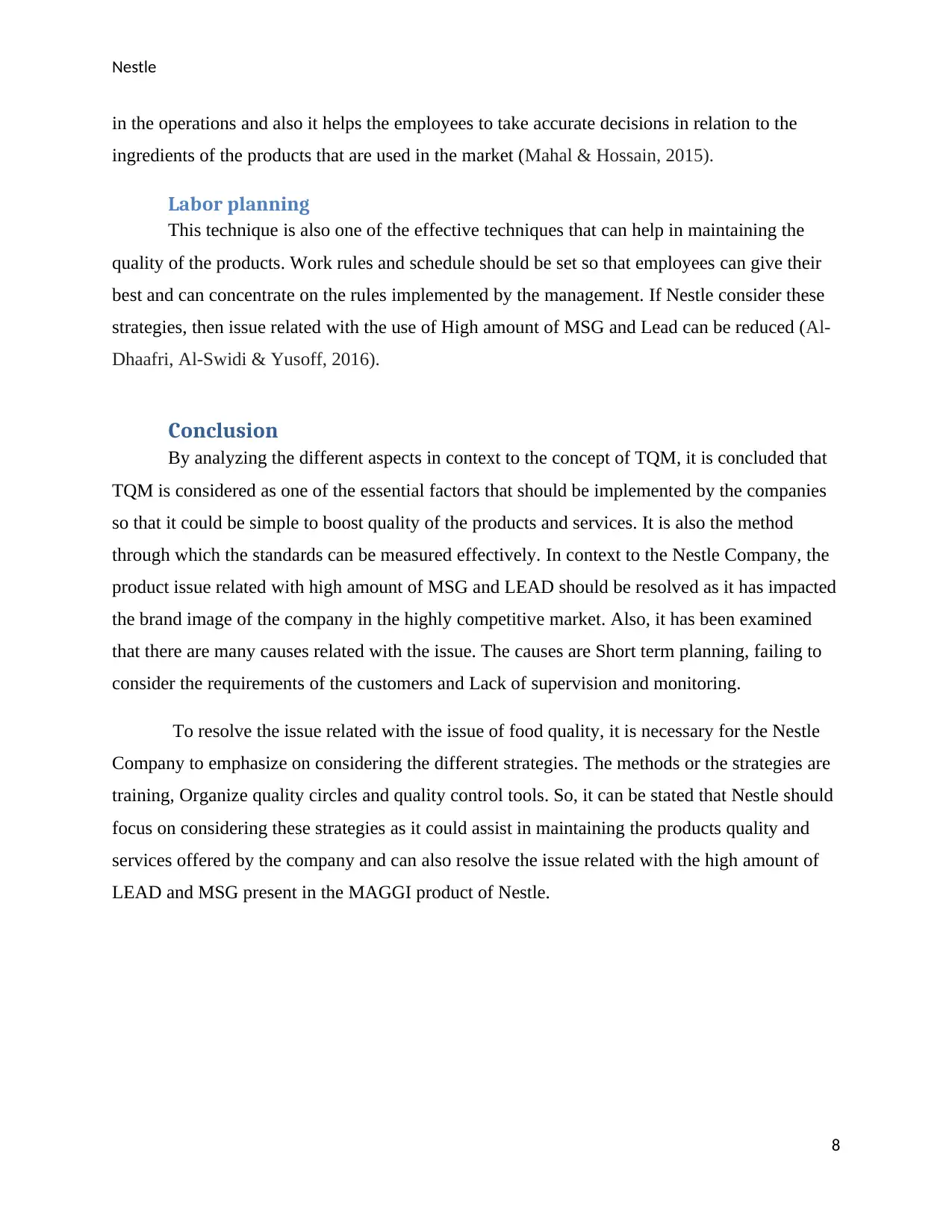
Nestle
in the operations and also it helps the employees to take accurate decisions in relation to the
ingredients of the products that are used in the market (Mahal & Hossain, 2015).
Labor planning
This technique is also one of the effective techniques that can help in maintaining the
quality of the products. Work rules and schedule should be set so that employees can give their
best and can concentrate on the rules implemented by the management. If Nestle consider these
strategies, then issue related with the use of High amount of MSG and Lead can be reduced (Al-
Dhaafri, Al-Swidi & Yusoff, 2016).
Conclusion
By analyzing the different aspects in context to the concept of TQM, it is concluded that
TQM is considered as one of the essential factors that should be implemented by the companies
so that it could be simple to boost quality of the products and services. It is also the method
through which the standards can be measured effectively. In context to the Nestle Company, the
product issue related with high amount of MSG and LEAD should be resolved as it has impacted
the brand image of the company in the highly competitive market. Also, it has been examined
that there are many causes related with the issue. The causes are Short term planning, failing to
consider the requirements of the customers and Lack of supervision and monitoring.
To resolve the issue related with the issue of food quality, it is necessary for the Nestle
Company to emphasize on considering the different strategies. The methods or the strategies are
training, Organize quality circles and quality control tools. So, it can be stated that Nestle should
focus on considering these strategies as it could assist in maintaining the products quality and
services offered by the company and can also resolve the issue related with the high amount of
LEAD and MSG present in the MAGGI product of Nestle.
8
in the operations and also it helps the employees to take accurate decisions in relation to the
ingredients of the products that are used in the market (Mahal & Hossain, 2015).
Labor planning
This technique is also one of the effective techniques that can help in maintaining the
quality of the products. Work rules and schedule should be set so that employees can give their
best and can concentrate on the rules implemented by the management. If Nestle consider these
strategies, then issue related with the use of High amount of MSG and Lead can be reduced (Al-
Dhaafri, Al-Swidi & Yusoff, 2016).
Conclusion
By analyzing the different aspects in context to the concept of TQM, it is concluded that
TQM is considered as one of the essential factors that should be implemented by the companies
so that it could be simple to boost quality of the products and services. It is also the method
through which the standards can be measured effectively. In context to the Nestle Company, the
product issue related with high amount of MSG and LEAD should be resolved as it has impacted
the brand image of the company in the highly competitive market. Also, it has been examined
that there are many causes related with the issue. The causes are Short term planning, failing to
consider the requirements of the customers and Lack of supervision and monitoring.
To resolve the issue related with the issue of food quality, it is necessary for the Nestle
Company to emphasize on considering the different strategies. The methods or the strategies are
training, Organize quality circles and quality control tools. So, it can be stated that Nestle should
focus on considering these strategies as it could assist in maintaining the products quality and
services offered by the company and can also resolve the issue related with the high amount of
LEAD and MSG present in the MAGGI product of Nestle.
8
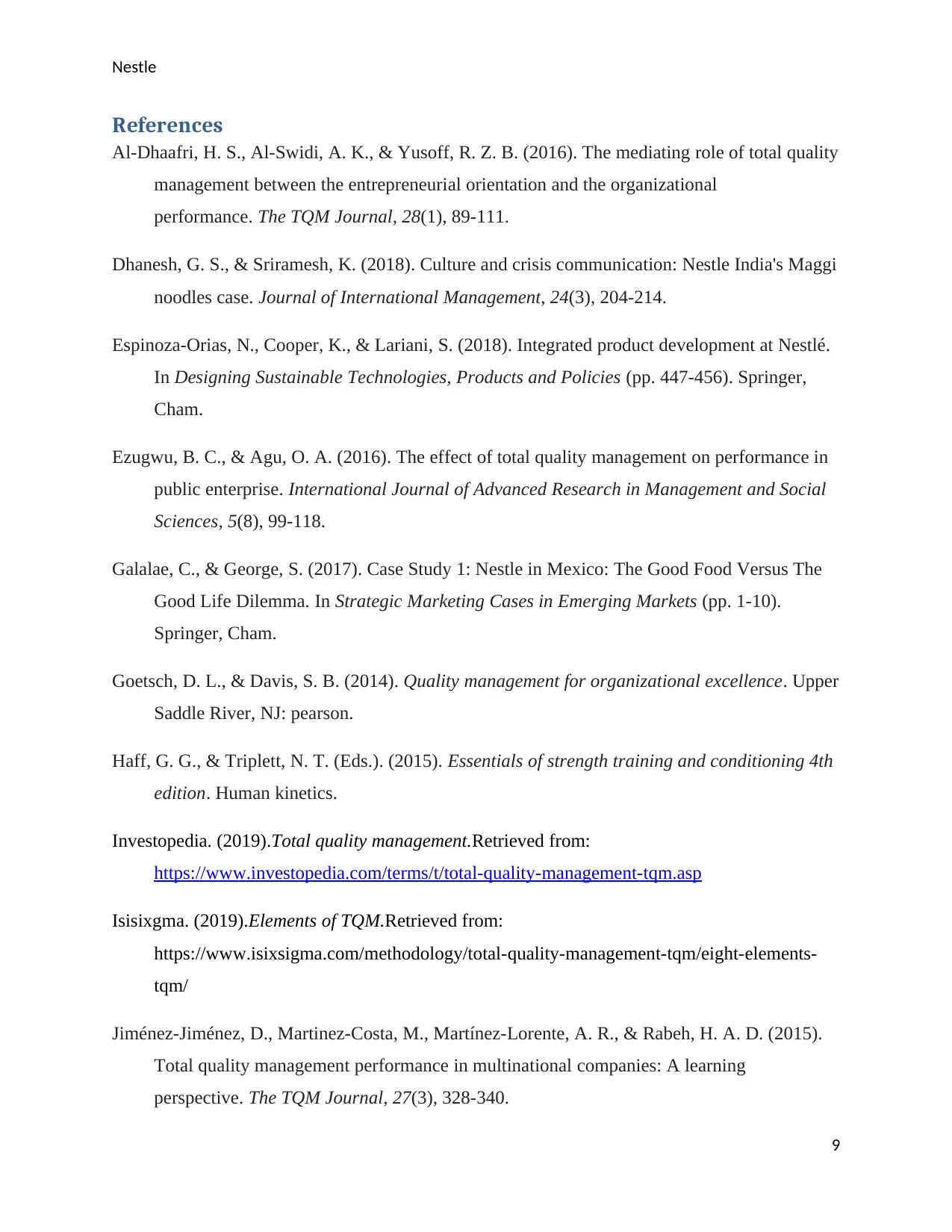
Nestle
References
Al-Dhaafri, H. S., Al-Swidi, A. K., & Yusoff, R. Z. B. (2016). The mediating role of total quality
management between the entrepreneurial orientation and the organizational
performance. The TQM Journal, 28(1), 89-111.
Dhanesh, G. S., & Sriramesh, K. (2018). Culture and crisis communication: Nestle India's Maggi
noodles case. Journal of International Management, 24(3), 204-214.
Espinoza-Orias, N., Cooper, K., & Lariani, S. (2018). Integrated product development at Nestlé.
In Designing Sustainable Technologies, Products and Policies (pp. 447-456). Springer,
Cham.
Ezugwu, B. C., & Agu, O. A. (2016). The effect of total quality management on performance in
public enterprise. International Journal of Advanced Research in Management and Social
Sciences, 5(8), 99-118.
Galalae, C., & George, S. (2017). Case Study 1: Nestle in Mexico: The Good Food Versus The
Good Life Dilemma. In Strategic Marketing Cases in Emerging Markets (pp. 1-10).
Springer, Cham.
Goetsch, D. L., & Davis, S. B. (2014). Quality management for organizational excellence. Upper
Saddle River, NJ: pearson.
Haff, G. G., & Triplett, N. T. (Eds.). (2015). Essentials of strength training and conditioning 4th
edition. Human kinetics.
Investopedia. (2019).Total quality management.Retrieved from:
https://www.investopedia.com/terms/t/total-quality-management-tqm.asp
Isisixgma. (2019).Elements of TQM.Retrieved from:
https://www.isixsigma.com/methodology/total-quality-management-tqm/eight-elements-
tqm/
Jiménez-Jiménez, D., Martinez-Costa, M., Martínez-Lorente, A. R., & Rabeh, H. A. D. (2015).
Total quality management performance in multinational companies: A learning
perspective. The TQM Journal, 27(3), 328-340.
9
References
Al-Dhaafri, H. S., Al-Swidi, A. K., & Yusoff, R. Z. B. (2016). The mediating role of total quality
management between the entrepreneurial orientation and the organizational
performance. The TQM Journal, 28(1), 89-111.
Dhanesh, G. S., & Sriramesh, K. (2018). Culture and crisis communication: Nestle India's Maggi
noodles case. Journal of International Management, 24(3), 204-214.
Espinoza-Orias, N., Cooper, K., & Lariani, S. (2018). Integrated product development at Nestlé.
In Designing Sustainable Technologies, Products and Policies (pp. 447-456). Springer,
Cham.
Ezugwu, B. C., & Agu, O. A. (2016). The effect of total quality management on performance in
public enterprise. International Journal of Advanced Research in Management and Social
Sciences, 5(8), 99-118.
Galalae, C., & George, S. (2017). Case Study 1: Nestle in Mexico: The Good Food Versus The
Good Life Dilemma. In Strategic Marketing Cases in Emerging Markets (pp. 1-10).
Springer, Cham.
Goetsch, D. L., & Davis, S. B. (2014). Quality management for organizational excellence. Upper
Saddle River, NJ: pearson.
Haff, G. G., & Triplett, N. T. (Eds.). (2015). Essentials of strength training and conditioning 4th
edition. Human kinetics.
Investopedia. (2019).Total quality management.Retrieved from:
https://www.investopedia.com/terms/t/total-quality-management-tqm.asp
Isisixgma. (2019).Elements of TQM.Retrieved from:
https://www.isixsigma.com/methodology/total-quality-management-tqm/eight-elements-
tqm/
Jiménez-Jiménez, D., Martinez-Costa, M., Martínez-Lorente, A. R., & Rabeh, H. A. D. (2015).
Total quality management performance in multinational companies: A learning
perspective. The TQM Journal, 27(3), 328-340.
9
⊘ This is a preview!⊘
Do you want full access?
Subscribe today to unlock all pages.

Trusted by 1+ million students worldwide
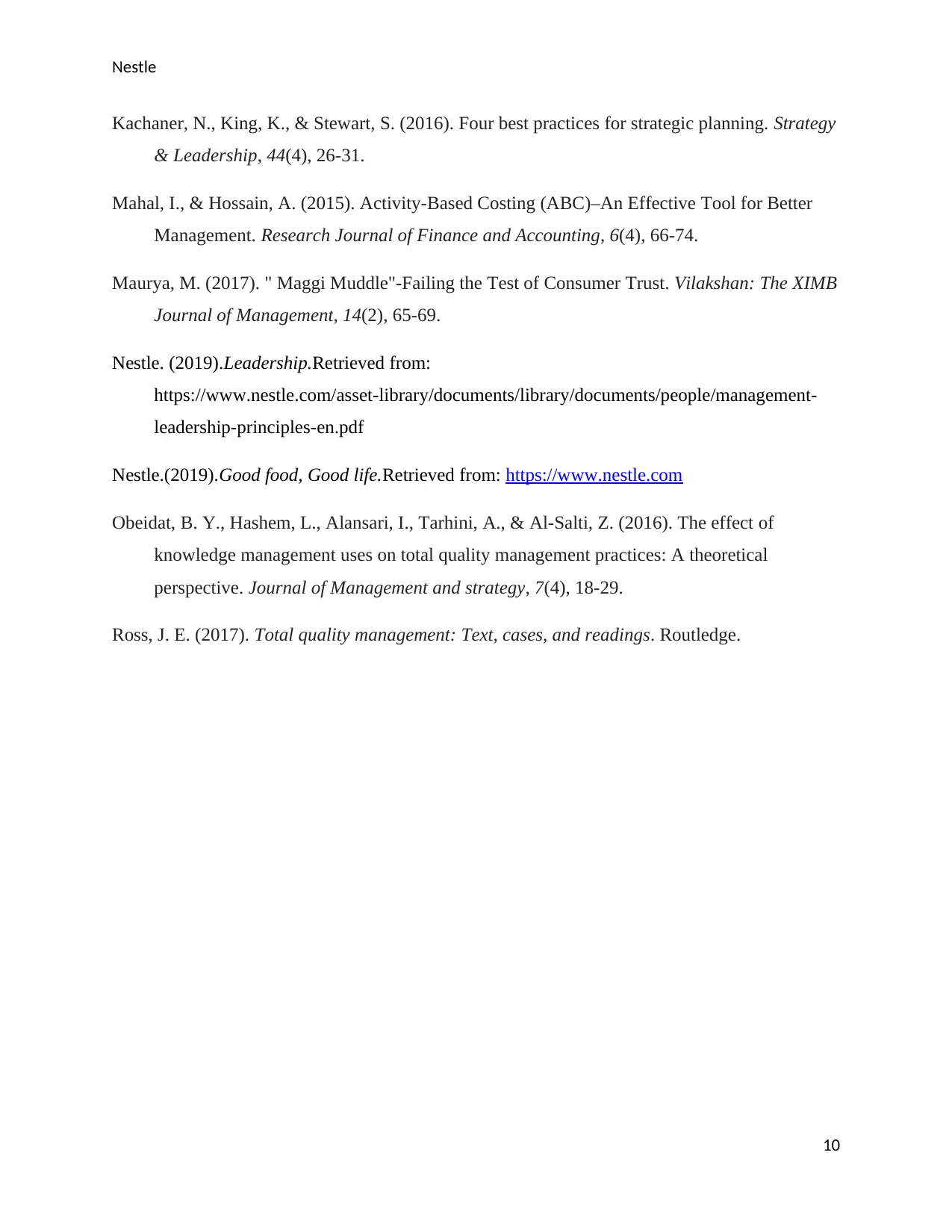
Nestle
Kachaner, N., King, K., & Stewart, S. (2016). Four best practices for strategic planning. Strategy
& Leadership, 44(4), 26-31.
Mahal, I., & Hossain, A. (2015). Activity-Based Costing (ABC)–An Effective Tool for Better
Management. Research Journal of Finance and Accounting, 6(4), 66-74.
Maurya, M. (2017). " Maggi Muddle"-Failing the Test of Consumer Trust. Vilakshan: The XIMB
Journal of Management, 14(2), 65-69.
Nestle. (2019).Leadership.Retrieved from:
https://www.nestle.com/asset-library/documents/library/documents/people/management-
leadership-principles-en.pdf
Nestle.(2019).Good food, Good life.Retrieved from: https://www.nestle.com
Obeidat, B. Y., Hashem, L., Alansari, I., Tarhini, A., & Al-Salti, Z. (2016). The effect of
knowledge management uses on total quality management practices: A theoretical
perspective. Journal of Management and strategy, 7(4), 18-29.
Ross, J. E. (2017). Total quality management: Text, cases, and readings. Routledge.
10
Kachaner, N., King, K., & Stewart, S. (2016). Four best practices for strategic planning. Strategy
& Leadership, 44(4), 26-31.
Mahal, I., & Hossain, A. (2015). Activity-Based Costing (ABC)–An Effective Tool for Better
Management. Research Journal of Finance and Accounting, 6(4), 66-74.
Maurya, M. (2017). " Maggi Muddle"-Failing the Test of Consumer Trust. Vilakshan: The XIMB
Journal of Management, 14(2), 65-69.
Nestle. (2019).Leadership.Retrieved from:
https://www.nestle.com/asset-library/documents/library/documents/people/management-
leadership-principles-en.pdf
Nestle.(2019).Good food, Good life.Retrieved from: https://www.nestle.com
Obeidat, B. Y., Hashem, L., Alansari, I., Tarhini, A., & Al-Salti, Z. (2016). The effect of
knowledge management uses on total quality management practices: A theoretical
perspective. Journal of Management and strategy, 7(4), 18-29.
Ross, J. E. (2017). Total quality management: Text, cases, and readings. Routledge.
10
1 out of 10
Related Documents
Your All-in-One AI-Powered Toolkit for Academic Success.
+13062052269
info@desklib.com
Available 24*7 on WhatsApp / Email
![[object Object]](/_next/static/media/star-bottom.7253800d.svg)
Unlock your academic potential
Copyright © 2020–2026 A2Z Services. All Rights Reserved. Developed and managed by ZUCOL.





